Health trackers are watches and other devices that are designed to record and track data about the user’s health. Often, this includes things like the number of steps you’re taken and how many calories you’ve burned.
Take a look at some of the top health trackers on the market below.
Rankings
1. Garmin Vivosmart 4
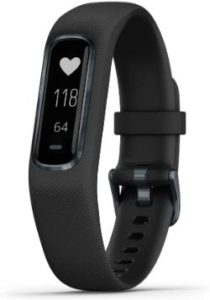
This monitor tracks everything from your blood oxygen saturation to your REM sleep cycles. It also has interactable features, like a relaxation timer. Of course, it can track all sorts of different exercises, including swimming.
This Garmin watch can also connect with your phone to receive calls and text messages. For these reasons, it is our #1 pick.
2. Fitbit Inspire HR
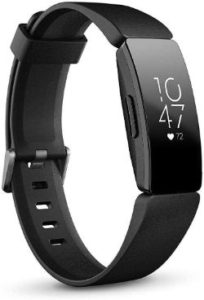
Fitbit is a top brand in the health tracker industry, and this particular watch is one of its most affordable options. It measures your heart rate 24/7 and tracks all sorts of parameters, including steps, distance, hourly activity, and the number of calories you’ve burned.
We particularly liked this watch’s extended battery time.
3. LETSCOM Smart Watch
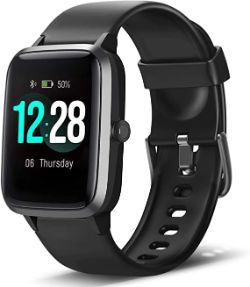
This watch is much less expensive than most of the others on the market, making it a good budget option. It can track your heart rate, sleep, and several other standard variables.
It also has a bigger-than-average display screen, which makes it suitable for seniors and those with bad eyesight.
4. Fitbit Versa 2
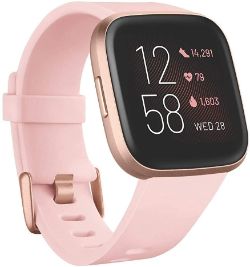
This Fitbit is one of their top watches. It can sync with your phone to control your Spotify app, create playlists, and download Pandora stations. It can track everything from your heart rate to how many floors you’ve climbed.
It also can last six days before needing to re-charge.
5. Fitbit Charge 3
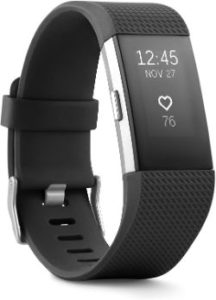
Choose from 15 different exercises to track with this health tracker. This watch is one of the premium options when it comes to health tracking. It can continuously monitor your heart rate and has a battery life of seven days.
However, because of its premium features, it is a bit more expensive than most.
6. Xiomi Mi Band 4
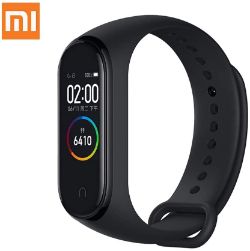
Though it is lesser-known, this health tracker is a great option. It supports heart rate monitoring and automatically keeps track of your sleep. It also comes with six different workouts modes.
What makes this watch stand out, though, is its low price. For a fraction of the cost of the competition, this health tracker can keep up with dozens of data points.
7. YAMAY Fitness Tracker
![]()
This is an inexpensive watch that is quite stylish. It comes in many different colors and is suitable for both men and women.
It tracks many of the points you’d expect from a health tracker, including your sleep and blood oxygen saturation level.
8. Bellabeat Leaf Jewelry Health Tracker
![]()
If you aren’t a fan of wearing watches, this pendant is a great option. It never needs charged and allows you to continue tracking 24 hours a day.
It is designed mainly for women, and therefore keeps track of things like reproductive health and your menstrual cycle, as well as the usual health metrics.
9. Fitbit Alta HR
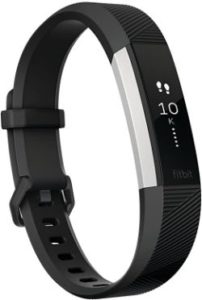
The Fitbit Alta HR is one of Fitbit’s slimiest designs to date. It is best for those with smaller wrists or who just aren’t a fan of bulky watches.
It keeps up with all the usual health metrics, like the number of calories burned and the number of steps you’ve taken.
10. Lintelek Fitness Tracker
![]()
Though it is designed by a lesser-known brand, this watch is a reliable, inexpensive choice. It tracks up to 14 different types of exercises and has long battery life.
We love that it came with intelligent reminders, which means the watch will remind you of notifications whenever you sit down and stop moving.
How We Ranked
When it comes to health trackers, the essential feature to consider is their accuracy. Not all health trackers are equally as accurate as others. Some are notorious for messing up how many steps you’ve taken or incorrectly reading your heart rate. A health tracker isn’t going to do you much good if it isn’t good at tracking your health.
Because of this, the number one thing we considered when choosing each fitness tracker is its accuracy. We gleaned this information mainly from customer reviews and similar sources of information. This is one of the reasons why so many trackers from the Fitbit brand are on our top 10 list – they are well-known for being very accurate.
Secondly, another essential factor we took into consideration was the value. We know that most of our readers aren’t looking to spend a fortune on a health tracker. Furthermore, many health trackers are very similar to each other. Cost is not always directly tied with better performance, which can often make purchasing an extremely expensive tracker overkill.
When rating each watch, we considered the features it came with and how that compared to trackers of different costs. If a tracker was less expensive and came with lots of features, we rated it high. If a tracker was more expensive at no apparent benefit to the customer, we rated it lower.
Thirdly, we considered how versatile each watch was. Some watches were designed to track five or so types of exercise, while others could track up to 15. We rated the trackers that could track different activities up higher than those that could track fewer. We also considered whether or not the watch as waterproof, which would affect whether or not it could track swimming.
Finally, we also took into account how the watch looked and how comfortable it was. Some watches were slimmer and an excellent fit for smaller wrists, while others were built with large displays. We didn’t necessarily rank the watches based on their size alone, as long as they were comfortable for most wearers.
Benefits
Health trackers can improve your learning and memory. Studies have shown exercising a certain amount before you sit down to study can enhance your mind and help you learn faster. These effects seem to be apparent after at least one week of exercise, though the length of training and frequency matters too (1). You can’t just exercise for thirty minutes on Monday and expect the effects to be felt on Friday.
The best way to maximize each study session is to move for an hour or so before you begin studying. In typical situations, this can be somewhat difficult to keep up with, especially if you’re already busy. With a health tracker, though, you can see if that sprint in between classes was enough to improve your memory and learning abilities.
Health trackers can help you maintain an appropriate amount of exercise. Everyone should have a minimum exercise goal they’re aiming for each day. Not only will exercise help you lose weight and stay toned, but it can also lower your chances of all sorts of different diseases.
For example, one study showed that everyone should at least have 15-minutes a day of moderate exercise. This adds up to about 90 minutes a week. Those who exercise for this amount had an overall 14% lower chance of mortality and a 3-year longer life expectancy (2).
With that said, more exercise is generally considered better as long as you do it safely and don’t push your body too far (2). Every 15-minutes of added exercise each day was associated with a mortality decrease of 4% and a lower cancer rate of 1%, for example.
Of course, remembering out much you’ve exercised each day can be difficult, especially if you tend to grab exercise wherever you can. In these cases, a health tracker can be beneficial in keeping up with all the different instances where you’ve exercised.
Health trackers can lower your blood pressure. If you have high blood pressure, regular exercise can help you manage it. This is true for both types of high blood pressure (3). To get the benefit of an exercise routine, it is essential to keep track of your activity. A health tracker can make this extremely easy and straightforward. Many will do it for you automatically with very little input from you.
High blood pressure is linked with heart disease, as well as kidney problems and dementia (4). These associations make it extremely important to get your high blood pressure under control as quickly as possible. Exercise is a fast and easy way to accomplish this.
Health trackers can prevent heart disease. On top of regulating your blood pressure, which in turn lowers your chance of heart problems, health trackers can also help you avoid heart disease in other ways (5). Research has shown extensively that getting the right amount of exercise and the right kind of activity can lower your chance for heart disease. Those who are at risk for heart disease are often encouraged to exercise to decrease their overall risk. If you’re sedentary, you have the most to benefit from increasing your current amount of exercise. However, those who are already somewhat active will still benefit from increasing your overall exercise amount.
Of course, keeping up with how much exercise you’re doing can be difficult. Leisure time and that sprint up the stairs when you’re late to a meeting both count as exercise, even if you aren’t following a specific exercise regimen. However, figuring out how much you’ve moved in a day can be time-consuming, unless you have a health tracker that is doing it for you.
Health trackers can gather data for your doctor. Some doctors have begun using health trackers to keep up with their patient’s data. Doctors can’t always be there to measure your pulse or ensure you’re sticking to your exercise plan. However, health trackers are an extremely convenient way to keep up with this information and share it with your doctor.
We hear stories every day about health trackers alerting their wearers to unknown health problems. While health trackers do not take the place of your doctor, they can be used as a tool to gather information. Instead of doing a stress test in a doctor’s office, for instance, you may be able to share the data from your last run. This cuts down on the cost and time needed before the doctor can reach a diagnosis.
Out of all the health trackers available, Fitbits are most commonly used by health professionals (6). If you have a health condition, we recommend purchasing a Fitbit to ensure your doctor can use the data your health tracker gathers.
Health trackers can manage and prevent diabetes. Insulin resistance is a severe problem in the United States and around the world. According to the CDC, about 1 in 3 Americans currently have pre-diabetes, though up to 80% of them are not diagnosed (7). This means that there is a perfect chance you have pre-diabetes, even if you’re otherwise healthy and have not been diagnosed.
Luckily, there is quite a lot you can do to manage both pre-diabetes and type 2 diabetes if you already have it. Exercise has been shown over and over again to improve insulin resistance. Since both diabetes and pre-diabetes are a result of unhealthy insulin resistance, activity can go a long way to counteracting any current insulin problems, and you might have to prevent new ones from forming (8).
Of course, there are also other things you can do, as well. Diet is also recommended to help manage diabetes and prevent it from occurring. Luckily, many health trackers can sync to health apps, which often include options for food tracking.
Health trackers can be a massive help by helping you track your exercise level and diet.
Health trackers can help you sleep better. A huge often overlooked part of our health is sleep. Everyone needs rest and your quality and quantity of sleep can have a direct impact on your health. Sleep deprivation can gravely affect your cognition, including things like your mood and alertness. Those who don’t get enough sleep often perform worse on tasks that require attention, memory, and executive function (9). In other words, a lack of sleep takes you years back in terms of brain development. A 12-year-old who is sleep deprived is more on-par with a 9-year-old developmentally speaking. Adults are no different. If you want your brain to be at its best, you simply must get enough sleep.
It doesn’t take very long periods of deprivation for these adverse effects to happen, either. While staying up all night will, of course, affect your cognitive skills, missing only an hour of sleep can have a significant impact as well. Only a few hours of lost sleep can have a direct effect on your ability to handle your emotions and cognitive skills that involve your feelings, like memory and your mood. With that said, more logical skills like decision-making are usually not affected by these small amounts of sleep deprivation.
Not getting enough sleep has also been tied to various diseases by a few scientific studies. One of the newest discoveries in science is that sleep can directly affect the mood of depressed patients and decrease the number and severity of tremors in those with Parkinson’s (10). To put things even more dramatically, some of those who were depressed improved so much that they no longer met the criteria for depression – all by just getting the correct amount of sleep.
Nearly all health trackers can help you keep up with your sleep and maximize it, preventing these diseases, and improving your cognitive function.
Side Effects
Health trackers aren’t 100% accurate. No health tracker is precise all of the time. Any tracker you get is going to miscount your steps or the distance you traveled at least once or twice, if not more. Luckily, for many users, being a step or two off isn’t a huge deal. It won’t affect the watch’s burned calorie count very much and likely won’t encourage a change in your behavior.
However, some health trackers are more accurate than others. Some have a tough time accurately counting the number of steps you’ve taken and can have significant miscalculations in regards to distance. Others have difficulty tracking certain activities, like climbing stairs or swimming.
Furthermore, you can not merely rely on your intuition when it comes to figuring out whether or not your tracker is accurate. One study found that those who wore health trackers had a tough time figuring out whether or not they were correct. Users often assumed the trackers were accurate even when they were way off.
Some participants reported setting up “tests” to figure out how accurate their watch was, such as counting their steps for a certain amount of time and comparing their number to the number on their health tracker. However, while these tests were good at figuring out how accurate the health tracker was on specific metrics, just because their tracker could accurately count steps doesn’t mean it carefully counted the distance they walked or the calories they’ve burned. Plus, there is no way for the average person to test specific data points, like the number of calories burned on a walk (11).
For this reason, it is essential to purchasing a quality tracker that can easily keep up with your steps and all the activities you plan on doing. If you regularly go mountain-climbing, be sure to purchase a tracker that can keep up with this activity.
Health trackers don’t necessarily cause a change in behavior. While you might think that having access to various health-related metrics would cause someone to change their behavior, this isn’t always the case. One study found that health trackers aren’t associated with behavioral change over the long-term (12). In other words, while some might change their behavior right after getting the tracker, the usefulness of the tracker quickly wore off. It is likely that many participants in the study stopped using the tracker after a certain period or stopped paying attention to specific measurements.
Health trackers can be beneficial in keeping up with your steps and other pieces of health information. However, they can’t make you take more steps in a day or eat a healthy diet. Plus, you have to remember to use the tracker for it to be useful at all. If you don’t put your watch on, it isn’t going to be very helpful. These trackers are only as useful as you make them.
Furthermore, studies have also shown that internal motivation is the most significant component of losing weight and getting healthier (13). Health trackers cannot make you develop this inner motivation. They can help you get fit if you want to, but they can’t make you want to get healthy, to begin with.
Health trackers can be expensive. Overall, the top health trackers cost about $100, though you can find good, less costly options as well. You can also find premium health trackers that sell for hundreds of dollars. Generally, the more expensive the tracker is, the better it is. This is an area where you get what you pay for.
Not everyone has lots of money to spend on a health tracker. Plus, if you aren’t going to use it extensively, it might not even be worth spending the money on. Trackers can be beneficial if you’re going to use them. However, if you aren’t, it is best not to spend the money.
Recommended Usage
Health trackers are designed to be used all the time. To get an accurate overview of your health, you will need to wear your tracker whenever you’re moving. Many trackers also collect data when you aren’t moving, which makes it essential to wear them even when you’re just sitting at your desk. Furthermore, the vast majority of health trackers on the market today also track your sleep, so you’ll need to wear them to bed to make the most out of them as well.
Many trackers are designed to be at least somewhat aesthetically pleasing, so you can wear them to work and more formal events. They’re also designed to be comfortable and durable enough to withstand this constant wear.
If, for whatever reason, you decide not to wear your tracker all the time, remember that it likely won’t be as accurate as it would be otherwise. After all, it really won’t be able to figure out how many calories you’ve burned in a day if you haven’t worn it all day. Even walking around the office burns some calories, which can add up over time.
FAQs
What is the most accurate health tracker? Both the Garmin and Fitbit trackers are pretty accurate. Of course, because they are designed with some of the top technology, you will be paying more for them than you would for other options. The Garmin Vivosmart 4 is one of the most accurate health trackers we found if you’re looking for a particular model to purchase.
However, most health trackers are about equally accurate once you reach around the $100 mark. Above that, trackers don’t get more specific. They just get more features.
Is Garmin or Fitbit better? In general, we find Garmin trackers to be more durable. These watches are more for those that play sports and are already active. They often have sport-specific modes and can track rarer activities, like mountain climbing, for instance. Many are also more waterproof, and they even make some watches that are suitable for snorkeling and similar activities. We particularly liked the Garmin Vivosmart 4.
Fitbit watches are marketed towards those that are just getting into fitness, however. They tend to focus more on things like step counting and sleep tracking while they are somewhat lacking in the sports arena. You can also purchase some models for cheaper than the Garmin trackers.
In the end, which one you purchase depends on what you’re looking for. Those who play sports will need a Garmin watch. If you don’t play sports, you could likely get away with less expensive Fitbit.
Do health trackers count steps if your arms aren’t moving? It depends on the tracker. More expensive trackers, like those made by Fitbit and Garmin, will likely be able to count your steps somewhat if your arms aren’t moving. With that said, the total likely won’t be as high as it might be otherwise, and the accuracy will probably be a bit off. The Fitbit website states: “If you’re doing something like pushing a stroller or shopping cart, your wrist-based device will count your steps, but the total may be slightly lower than usual” (14).
Less expensive watches that are made by lesser-known brands might not be able to count your steps at all if your arms aren’t moving, however. You’ll likely need to test and see if it counts your steps before relying on it.
How accurate are health trackers? This depends on the health tracker and the metric you’re trying to measure. Most trackers have less than 10% inaccuracy when it comes to counting things like your steps and distance. This is because these metrics are easier to track in general. If a tracker keeps up with sleep, it likely is pretty good at tracking this as well. Most trackers use your movements to figure out what sleep stage you’re in, which isn’t very difficult for a watch to figure out.
However, when it comes to more complicated metrics, like the number of calories you’ve burned, trackers often do a more mediocre job. In many cases, the margin of error jumps up to over 40%. Many different factors go into how many calories you’ve burned, including things like your age, the activity, how active you usually are, and more. Even things that the tracker has no access to, like your hormone levels and the outside temperature, can affect the number of calories you’ve burned. In these cases, it’s practically impossible for a health tracker to figure it out accurately.
Can health trackers improve health? Yes. Health trackers can provide information on important health metrics, which can help you figure out where your lifestyle needs tweaked. They can also be used in some circumstances to collect data for your doctor to diagnose and treat certain health conditions. When it comes to health, more information is almost always better.
With that said, though, health trackers are only as useful as you make them. If you don’t use your health tracker often, it isn’t going to be very helpful. Furthermore, trackers can’t make you change your behavior based on the information they give you. Only you can do that.
Do health trackers help you lose weight? If you’re using them to help up your activity level, then yes, they can help you lose weight. These trackers are unique in that they provide an accurate measurement of how much you’ve moved as well as an estimate on the number of calories you’ve burned. This allows you to make and measure precise goals that have to do with your movement, like a certain number of steps you’d like to take each day, for example. You wouldn’t be able to track these goals otherwise, which is what makes these trackers so excellent at helping you lose weight.
With that said, the trackers themselves don’t make you lose weight, of course. You aren’t going to lose weight just because you’re wearing one. The tracker can help you make accurate decisions about your health, but it won’t make you change your behavior.
Do health trackers track your steps? Most health trackers do keep up with your steps. With that said, though, some are better at tracking levels than others. Inexpensive trackers tend not to be as accurate. However, this shouldn’t be a problem for most users. One or two steps likely isn’t going to change your behavior that much or mess up your other metrics.
Is a health tracker worth it? This mostly depends on how much you’re going to be using the tracker, as well as how much it is going to affect your behavior. Preferably, you’d want to get a tracker to set specific fitness goals or to track your workouts. If you’re going to work towards taking a certain number of steps every day, a health tracker is a great option.
However, there isn’t much point in getting a tracker if you aren’t going to use it. To work correctly, you need to use a tracker almost invariably. This way, it can collect accurate data. A health tracker also isn’t handy if you aren’t going to change your behavior based on what the tracker says. If you’re going to continue taking your current number of steps, no matter what the actual count is, a tracker probably isn’t going to help you very much.
Is it safe to wear health tracker all the time? There are no negative consequences associated with wearing health tracker all the time. If you want the tracker to work correctly, you need to wear it as much as possible. There is no evidence that radiation given off by the watch or anything of that sort affects your health. As long as you’re using it appropriately, there is no reason not to wear it all the time.
With that said, there have been some reports of hackers using hacking into health devices, which they can then use to figure out information about you and even locate you. However, there have been no real-world reports of this happening – just theoretical possibilities.
Can health trackers tell if you have a heart attack? Firstly, health trackers are not doctors. They simply gather data and cannot make diagnoses based on this data. Often, strange readings are a result of a device malfunction, not necessarily a sign of something like a heart attack. With that said, most health trackers do keep up with your heart rate. This means they should be able to detect a heart attack theoretically. If you notice anything off with your health tracker and also experience other physical symptoms, you should contact your doctor immediately or call your local emergency number.
How do health trackers know you’re sleeping? Typically, they can figure out you’re sleeping based on your movement and your heart rate. This is also how they can figure out what stage of sleep you’re in and when you’re getting your best rest.
Related Articles
Recap
Health trackers can help you lose weight and take control of your health thanks to their ability to track all sorts of different metrics. Using this knowledge, you can tweak your workout regimen and reach your peak health. There are many different health trackers on the market, so we quickly reviewed some of the top-rated models to help you make the best choice possible.
For FitBug’s #1 recommended health tracker, click here.